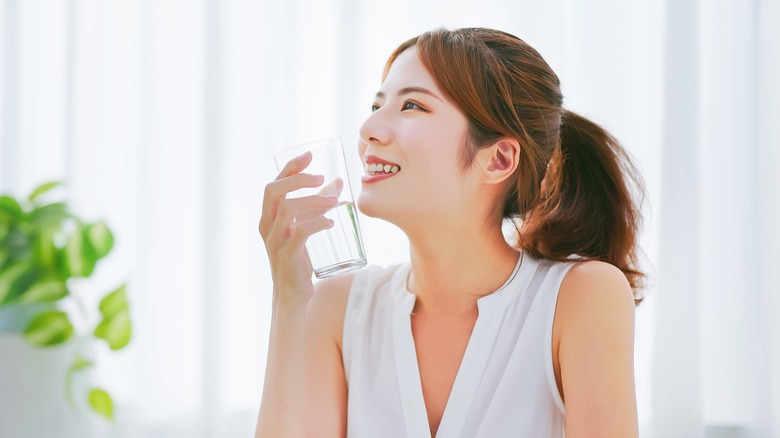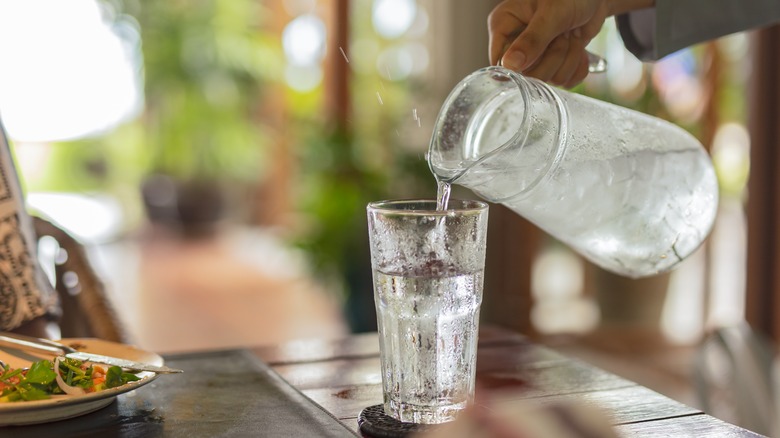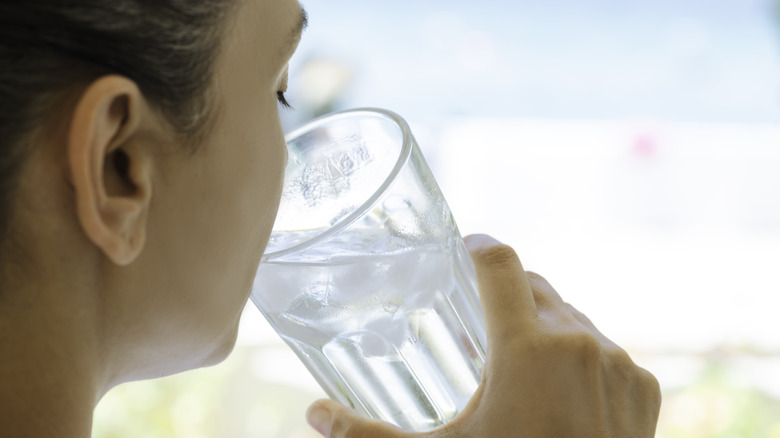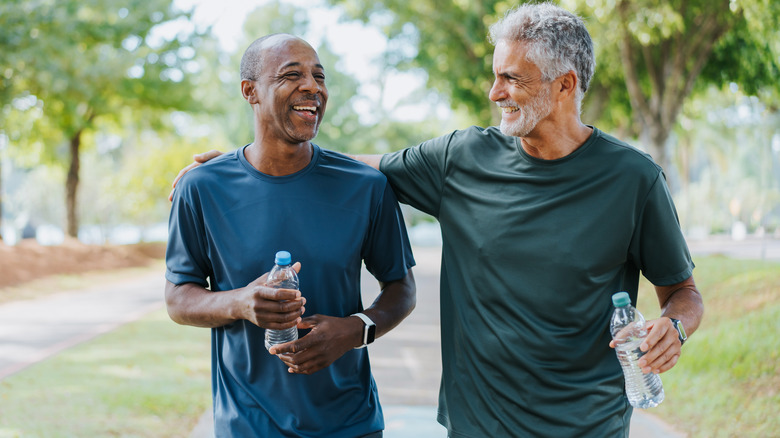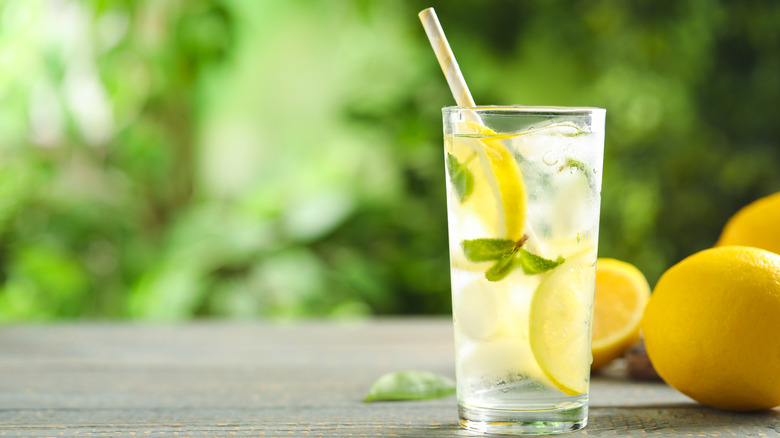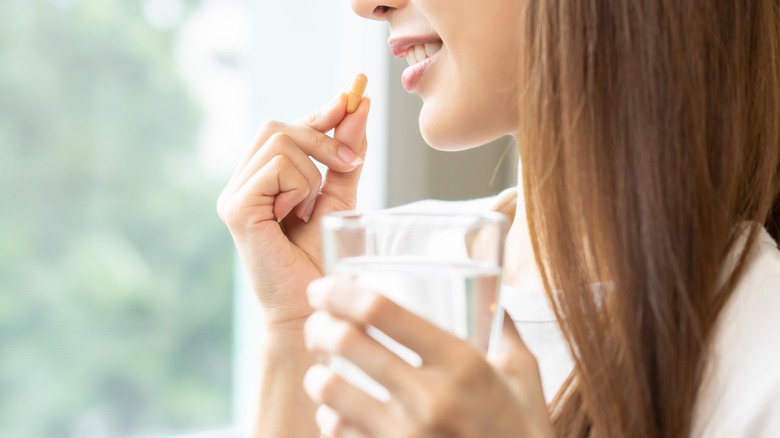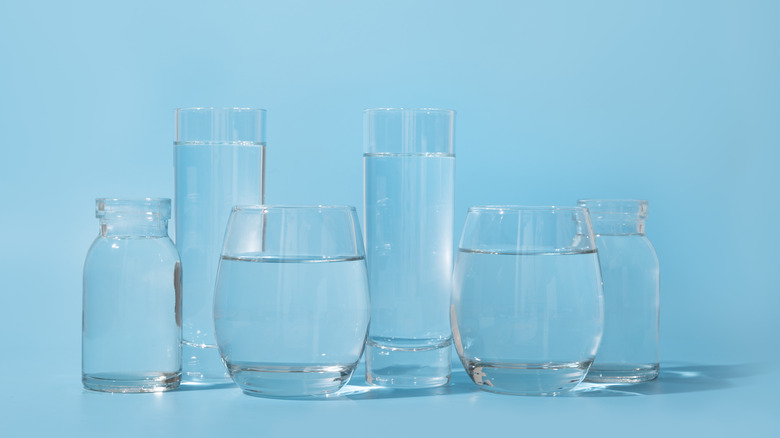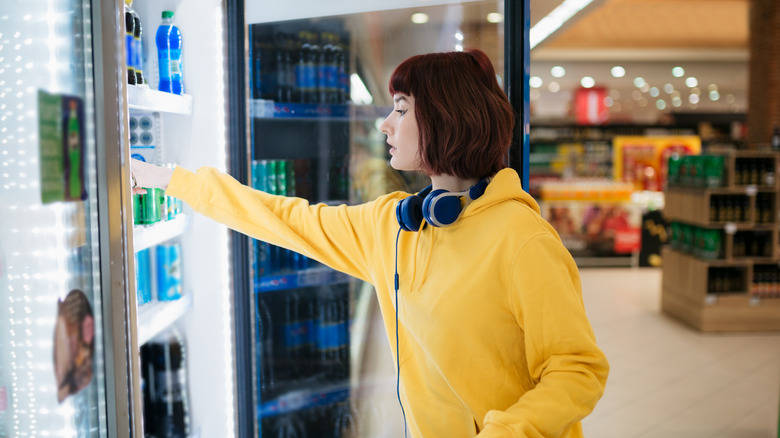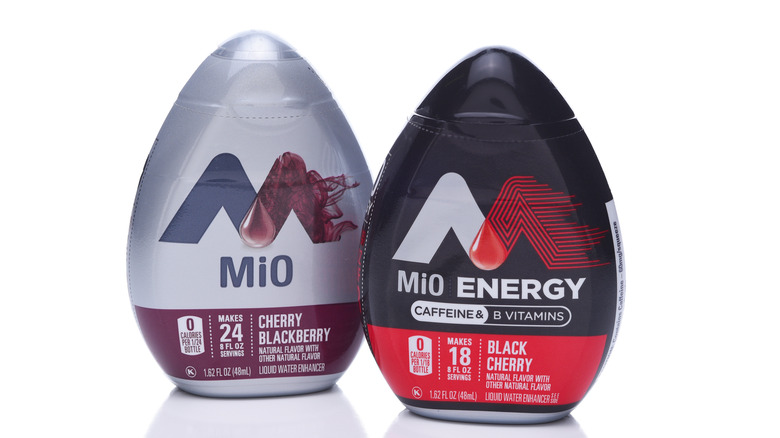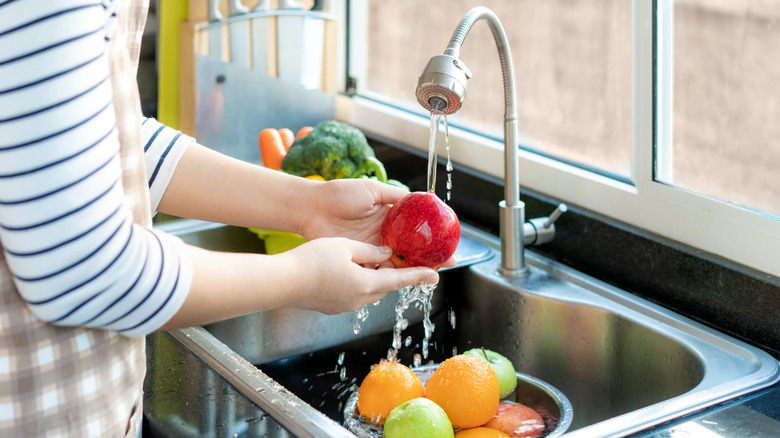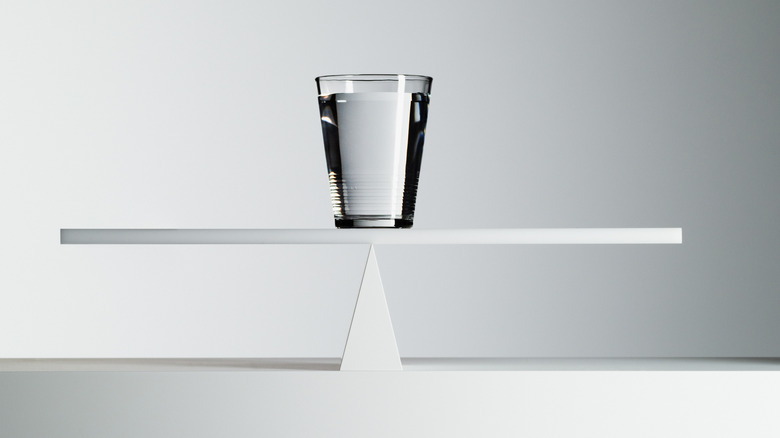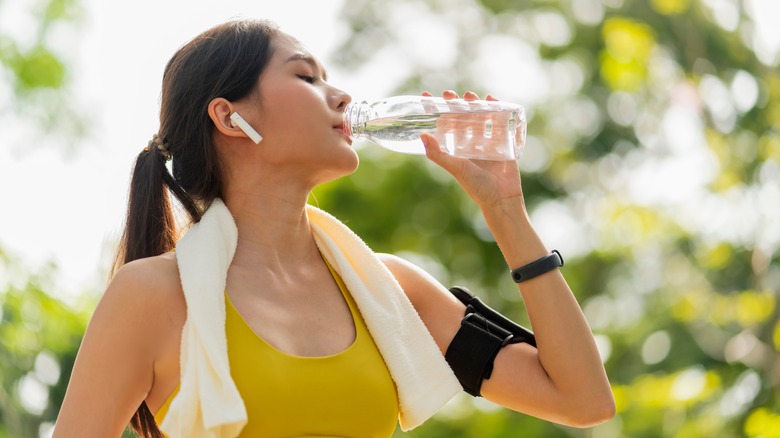Big Mistakes Everyone Makes When Drinking Water
Making sure you drink enough water every day seems like an easy task, but it turns out that there is a lot more to drinking plain ol' H2O than you might think. And sometimes the mistakes you make can result in mild dehydration or lead to more serious concerns like diseases or even death. When the weather heats up, it's especially important to avoid some of these mistakes so that you stay hydrated and safe. Being aware of the potential dangers of drinking water (beyond simple sanitation issues) can also help keep you out of the emergency room or worse.
It's important to know when to drink water, how much, as well as what kind. You also need to think about what you put in your water. We've put together a fairly comprehensive list of mistakes you should avoid with water, trying to bypass all the myths out there and deliver fact-based research. We warn you, though, that you'll be wanting to grab a tall glass of water by the time you finish reading.
Not drinking water (and the right amount) with meals
You've probably heard conflicting information about whether to drink water with meals. If you think that you shouldn't, you've probably fallen for some false assumptions.
Some people worry about ineffective digestion, thinking that water might dilute digestive enzymes and acids or not allow food enough contact time with them. However, a study in Clinical Nuclear Medicine found that liquids pass through the digestive system faster than solids, giving solids plenty of hang time with digestive juices. Your body also naturally releases water during digestion to assist these enzymes with their job, so water is not foreign to the whole process.
There are several reasons it's good to drink water with your meals. For one thing, water can help dissolve larger foods you swallow and keep them moving through your system so you don't end up constipated. A study in Obesity suggests that drinking two cups of water before a meal may even help you lose weight. However, part of this effect might be related to not eating as much food because you've filled up on water. A study in The Journal of Clinical Endocrinology and Metabolism (JCEM) shows a 30% increase in metabolism after drinking two cups of water, which is another reason it's a good idea to drink water with meals. Another study in JCEM shows an hour-long metabolism boost from drinking water. However, two cups of water (not just a few sips) are necessary for these metabolic benefits.
Thinking it's not healthy to drink cold water
There's another rumor that you might have heard that says that you shouldn't drink cold water. However, drinking water before meals at any temperature helps us to eat less. If you're one of those people who drinks more water when it's ice cold versus tepid, adding some ice cubes might entice you to drink more. Drinking cold water during a workout is also beneficial. A study from the Journal of the International Society of Sports Nutrition found that drinking cold water helped keep people from overheating and improved their sports performance. In fact, a study in the International Journal of Clinical and Experimental Medicine shows that you sweat less after you drink cool tap water that's around 60 degrees Fahrenheit, helping to reduce the chances of dehydration.
There are, however, some benefits to drinking warm water rather than cold, so it all comes down to what you're hoping the water will do for you. Healthline says studies show that drinking warm water (between 130 degrees and 160 degrees Fahrenheit) can help you breathe better if you have nasal congestion, it may sooth a sore throat, and it may aid in dissolving and digesting food. So, there are some times when you might want to drink warm liquids or foods made with warm water (like tea or soup) instead of drinking cold water.
Drinking water from plastic bottles
The figures are staggering. Humans around the world have become so blind to our habits that we're using about 1.2 million plastic bottles every minute, according to EarthDay.org. That comes out to more than 1.7 billion every day and 630 billion every year. Sadly, only about 9% of those bottles are recycled. All those unrecycled bottles end up breaking into microplastics that contaminate the environment over time rather than actually decomposing. Your contribution to this problem probably isn't low unless you're using refillable bottles every time you drink water. Even drinking water from a plastic bottle just once a day contributes 365 plastic bottles to the problem each year. So, a little forethought in grabbing a refillable bottle of water next time you need a drink can do a lot to reduce waste.
Ecological problems aren't the only issues to consider when using plastic water bottles. A chemical additive called Bisphenol-A (BPA) has been a health concern in many plastic water bottles, so you should look for brands that use BPA-free plastics. According to Healthline, various studies have linked too-high BPA exposure to thyroid problems, infertility, obesity, chronic inflammation, diabetes, heart disease, certain cancers, and other health problems. Luckily, the FDA says that most people's exposure is within safe amounts. Just as concerning, though, is microplastic consumption. A study from Frontiers in Chemistry found these miniscule bits in 93% of the plastic water bottles tested around the world, which is disturbing.
Not adding lemon to water
If you are drinking water somewhere and you're feeling less than confident about its quality, adding lemons may help make it safer to drink. A study in the Bulletin of the Pan American Health Organization found that combining lemons with drinking water helped to kill the bacteria that causes cholera (Vibrio cholerae). The results were more profound in water that was more alkaline (like hard groundwater). It was also more potent in killing cholera if the water was at least 2% lemon juice and had sat for at least 30 minutes before being consumed.
Unfortunately, a study in the International Journal of Food Microbiology shows that, while lemon might reduce some bacteria, it doesn't seem to completely kill off some of the biggest baddies, like E. coli, salmonella, and listeria. Researchers in that study found that lemon juice killed less listeria than the other two contaminants.
So, while lemon won't kill off all the bacteria you could potentially have in your water, it's potent enough to kill some of it. If you don't have any other way of purifying your water, infusing it with lemon juice might be better than nothing.
Not drinking enough water with alcohol or medicine
If you've ever drunk too much alcohol and found yourself going to the restroom over and over, it's because alcohol is a diuretic. When you're not drinking alcohol, the hormone vasopressin helps you retain water in your system. However, alcohol suppresses vasopressin, making you need to urinate faster than your body can process the alcohol you just drank. All those trips to the restroom can end up dehydrating you if you're not drinking enough water with your alcoholic consumption. Cleveland Clinic suggests drinking a glass of water after every beer, glass of wine, or mixed drink to help you stay hydrated and prevent your body from shutting down from alcohol poisoning.
When it comes to medications, many instruct users to drink a full glass of water with them, but the truth is that you should be drinking a full glass of water (not just a couple of sips) with any medicine or supplement you take. Water helps you get the pill from your mouth to your stomach without it getting stuck somewhere along the way. When some medicines or supplements end up sticking to the side of your esophagus or stomach, they can make it difficult to swallow or cause tissue damage, bleeding, or even chest pain. Water also helps to dissolve the pill so that it doesn't pass right through you intact without providing any of the benefits that it should.
Not knowing how much water your body needs or knowing when your body needs it
When you're not getting enough water, your body will usually tell you, although we don't always realize that what we're experiencing is related to our water intake. Obviously, feeling thirsty is a sign of needing water. However, there are other symptoms, too, like feeling lightheaded or tired or having dark-colored urine. If your physical performance is suffering, your brain isn't feeling sharp, you're feeling moody, you have a headache, or you're constipated, it could be because you're not drinking as much water as you should.
So, how much water should you be drinking each day? There's no definitive consensus on the amount, and it also varies based on circumstances. Harvard Medical School experts suggest that women need about 11 and a half cups of water per day, while men need about 15 and a half cups a day. However, some of this water content comes from the foods you eat or other liquids you drink. If you're getting water from other food and drink sources, four to six cups of actual water may be enough each day. However, you'll need more if you're pregnant, breastfeeding, exercising, sweating, outside in hot temperatures, drinking alcohol, have certain diseases, or are taking certain types of medicines.
Not knowing what counts as water to keep you hydrated
Water isn't the only thing that can keep you hydrated. Foods and drinks also contain water that contributes to your overall intake for the day.
Many fruits and vegetables, for example, are made up mostly of water. As you can imagine, melons and anything you can easily turn into juice (like oranges) contain a lot of water. Any food you add water or liquids to before cooking can also help keep you hydrated, including soup, smoothies, and breakfast cereals with milk. However, relying on food alone to keep you hydrated can result in dehydration. You still need to consume four to six cups of hydrating liquids.
Any liquids, from milk to soft drinks and even caffeinated drinks like tea and coffee, contribute toward your overall hydration level. However, as we mentioned previously, alcohol dehydrates rather than hydrates. Studies also show that drinking too many caffeinated drinks like tea and coffee can affect your hydration level because they are diuretics. According to a Frontiers in Nutrition study, the dehydrating effect starts kicking in at about 2.7 milligrams of caffeine per pound of body weight. This means that a 150-pound person would start feeling the dehydrating effects after about 400 milligrams of caffeine, which is about four cups of coffee. You should also keep in mind that choosing liquids besides water to stay hydrated tends to add to your overall calorie intake for the day.
Using water enhancers without scrutinizing ingredients
People who are looking to stay hydrated without the added calories often turn to water enhancers to boost flavor. However, not all water enhancers are created equally. To eliminate calories and sugar, most contain artificial sweeteners, which may carry unwanted health risks. For example, a study in Diabetes Care indicates that drinking artificially sweetened beverages put people at a higher risk for incident metabolic syndrome and type 2 diabetes. Aspartame is one to be especially wary of since numerous studies have vilified it with links to everything from cancer and cardiovascular disease to migraines and strokes. A 2023 study published in the Journal of Toxicology and Environmental Health, Part B raised health concerns about sucralose, which was found to produce a chemical during digestion that damages DNA.
Two of the safer sweeteners with low glycemic indexes are stevia and monk fruit, which both come from natural sources. However, you want to ensure that they are not paired with erythritol, which a study led by the Cleveland Clinic found to have a connection to blood clots, heart attacks, and strokes (per NIH Research Matters).
Not washing fruits and veggies you add to water
If you want to add natural flavoring to your water with produce like strawberries, citrus fruits, or cucumbers, it's important to start out by washing them. You never know what they've come into contact with in the field, during packaging and transport, at the store, and even in your kitchen. If you're adding fruits or vegetables with the peeling still intact, it's especially important to clean them.
The FDA has specific instructions for washing fruits and vegetables before consuming them to help remove bacteria, dirt, and pesticides. To prevent contaminating the ingredients with bacteria on your hands, you should first wash your hands with soap and warm water for at least 20 seconds. Rinsing the produce before you cut or peel it will prevent transmitting germs and dirt from the outside to the inside. You'll want to wash the items under running water instead of dunking them in a container of water so that any filth washes away and you don't reinfect your foods. To assist with the cleaning process, you can simply rub softer produce clean with your hands, while firmer items like citrus fruit or melons may require a vegetable brush. Before slicing and adding to your water, you can remove residual bacteria from the items by drying them with a clean paper towel or cloth.
Not drinking water in moderation
Did you know that it's possible to drink too much water? In 2022, researchers published a study in Clinical Kidney Journal suggesting that action movie star Bruce Lee may have died from water poisoning. When he died at the age of 32 in 1973, the coroner's report blamed brain swelling on his untimely demise. However, he had several risk factors for hyponatremia, which is what ultimately ends up killing someone who drinks too much water.
Hyponatremia can occur for a number of reasons, including drinking too much water. If your body is already having difficulty removing excess fluids or you're losing sodium and fluids too quickly, drinking too much water can exacerbate the problem. Consuming more water than your body can handle dilutes the sodium in your blood. Your cells react to having too little sodium by taking on extra water and swelling. According to the Mayo Clinic, hyponatremia results in a number of symptoms that range from nausea and vomiting to low blood pressure and low energy. At the extreme end, you could become confused, have headaches, feel extra drowsy, fall into a coma, or even die.
Ultimately, you don't want to drink more liquid than your kidneys can process. The limit for what your body can process is 3.4 to 4.25 cups per hour or 84.5 to 122.12 cups per day. So, entering a drinking contest (with water or other liquids) is definitely a bad idea.
Not knowing how long water stays fresh and safe to drink
The length of time water is safe to drink or tastes good relates to source, storage, and contaminants. Water will start to taste stale after sitting for awhile in the open air gathering carbon dioxide and will likely taste different by the third day. However, if you cover it and get it out of the sun, it will maintain its fresh flavor longer. An open bottle of water in the refrigerator will likely stay at peak freshness for four to six days.
If water is in the sun or heat too long or if chlorine evaporates from tap water (which tends to have a shelf life of about six months), it can develop bacteria, mold, algae, or worse. A plastic water bottle left in the heat can develop higher levels of antimony than what the FDA deems safe. It only takes five days for bottled water to reach dangerous levels at 167 degrees Fahrenheit or 38 days at 150 degrees Fahrenheit — temperatures seen in vehicles on extremely hot days. Expiration dates on water bottles are also important since the microplastics and chemicals in plastics can seep into water over time. It's also a good idea to refrigerate any water bottles you don't finish drinking to slow down the growth of any bacteria your mouth introduced to the container. And washing or getting a new water glass every few days can also help cut down on bacteria.
Not understanding how much and what kind of water you need when out in the heat
When you exert yourself in the heat, it's essential to stay properly hydrated. Unfortunately, most of us don't know how much water we need. Before starting on an outdoor project or any sort of outdoor exercise, it's a good idea to pre-hydrate by drinking one and a half to two and a half cups of water two hours before you go out into the heat. Then, make sure you drink a half cup or full cup of water every 15 to 20 minutes while exerting yourself. If you're out for only a short time, plain, undistilled water is fine since it contains small amounts of electrolytes.
If you're out longer than an hour and a half or if you tend to sweat profusely, you should plan to have a drink with added electrolytes (like Gatorade) or eat food with added salts. When you replenish the electrolytes you lose while exercising, it can give you an energy and performance boost. It can also help prevent heat stroke by helping your body stay cool. You can even make your own sports drink at home with ingredients like salt, citrus juice, and coconut water.
While water and drinks with electrolytes can help keep you hydrated in the heat, you should avoid beverages that can dehydrate you like alcohol or caffeinated beverages like sodas, tea, or coffee. Always keep safety in mind in the heat.
